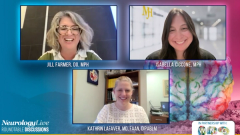
2025 Women in Neurology Conference: Educating, Mentoring, and Networking

Movement disorder specialists talked about how the 4th Annual Women in Neurology Conference will offer educational updates, career development, and networking opportunities for women across neurology. [WATCH TIME: 5 minutes]
WATCH TIME: 5 minutes | Captions are auto-generated and may contain errors.
The
In collaboration with the WNG, NeurologyLive® held a roundtable discussion with 2 of the conference’s program cochairs,
In this second episode, Farmer and LaFaver discussed how this year’s Women in Neurology conference will provide attendees with timely updates in neurology alongside career development sessions for both early- and mid-career professionals. The women neurologists noted that expert speakers at the conference will cover topics from academic and private practice pathways to wellness strategies. With a mix of educational sessions, professional guidance, and opportunities to recharge, the program cochairs underscored that the event aims to support women neurologists in both their clinical and professional growth.
Transcript edited for clarity.
Isabella Ciccone, MPH: What specifically are goals for this year's Women in Neurology Conference in Colorado Springs? Who should attend, and what are some of the highlights of the program?
Kathrin LaFaver, MD, FAAN, DipABLM: The conference this year will focus on a couple of different highlights. One is updates in neurology, mainly for those pursuing their maintenance and certification-MOC fee new article pathway. We have experts from various fields, including multiple sclerosis, movement disorders, stroke, and so on, covering relevant updates for these fields in a very timely and effective fashion, so people can get the highlights without having to spend too much time digging through some of these articles themselves. We did this at the last conference, and it was very well received; people were really excited about that.
I will also say that all of our speakers are members from the WNG, and we've always received very good feedback. It’s been really refreshing to hear some younger women give these updates and highlights, and just seeing some different faces compared with more established conferences, where again, just giving some people the highlights who might not have otherwise had the opportunity to give national talks. That has always been very well received.
The other goal of our conference is to really help with career questions and professionalism questions. The last time, we had a focus on imposter syndrome and did a workshop on it—it’s always a popular and important topic. This year, we're having a very established and sought-after career coach, Jessie Mahoney, MD, who has a coaching program called Pause and Present. She's very much focused on people in mid-career but also early career, offering space and opportunities to see how we can align ourselves with our career goals and avoid or address burnout, among some other topics she's tackling. She's also a certified yoga teacher and will offer yoga sessions to participate in, so I’m really looking forward to meeting her in person and attending her sessions.
Furthermore, we have additional career sessions for people in both academics and private practice. We have a session for mid-career people in academics specifically to tackle this very challenging time in one’s career, especially in academics, and we also provide advice for people planning to become their own boss and go into private practice. So there’s really something for everyone, and I’m very excited about so many of our sessions.
Lastly, we really want to create a space during that weekend for people to relax and recharge—from yoga to Zumba this year—and also to include some free time on the schedule to take in the beautiful nature of Colorado Springs. Some people are also planning to come a bit earlier or spend time after to take advantage of hiking and other activities in the area. We have an opening reception, and so one of the goals, besides all the interesting talks and learning, is really connecting people in person, going beyond social media, Facebook, and LinkedIn, and meeting in person to make friendships and reestablish connections. That has been really strengthening our community.
Jill M. Farmer, DO, MPH: Absolutely, and it’s evolved, which I think says a lot about our group. We're pretty nimble; we try to cater to what people are looking for. Our time is incredibly valuable, so we want to make sure that if you're going to take time out of your busy schedule to do something, the rate of return on what you're investing is worth it.
We have this dual track now because once people complete their maintenance of certification, if they don’t need to do that again for another 3 years, then there’s no reason for them to attend. So now we have the opportunity for people to take advantage of the maintenance of certification if they need that as their requirement, but also to do the career development track if they are still looking to participate in a conference that’s a little smaller, a little more relaxed and accessible, and still allows them to get their CMEs.
Newsletter
Keep your finger on the pulse of neurology—subscribe to NeurologyLive for expert interviews, new data, and breakthrough treatment updates.











